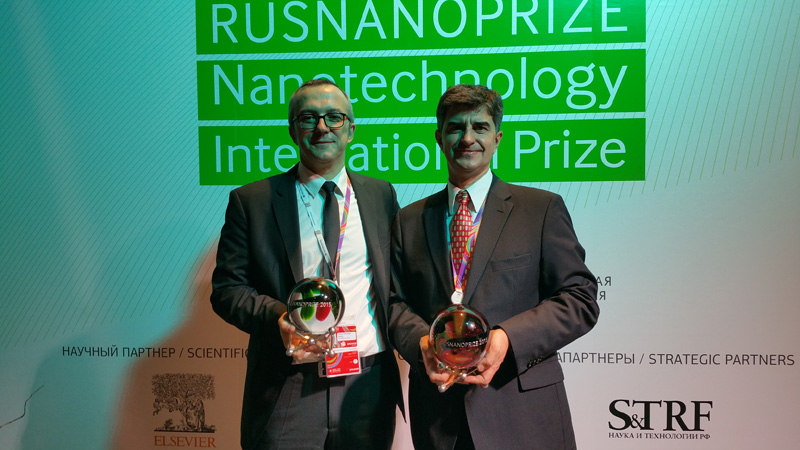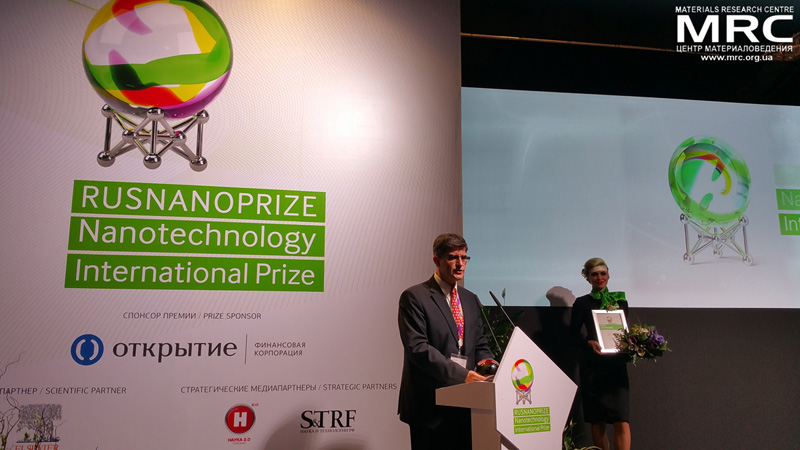Developments in the more efficient storage of electrical energy have allowed for the wide use of renewable energy from the sun and wind, put electric buses on the streets of many cities around the world, led to longer times between charging computer and cell phone batteries, and is expected to enable the Internet of Things and many other futuristic technologies. Technology developed at Drexel has contributed significantly to progress in this field and the faculty member leading this initiative has been recognized with a major international nanotechnology award.

RUSNANO Prize 2015 Winners Simon and Gogotsi
After a decade of cutting-edge collaborative research, Professor Yury Gogotsi, Distinguished University and Trustee Chair Professor at Drexel University, and Professor Patrice Simon, Professor in Materials Science at Paul Sabatier University in Toulouse, France, have been awarded the prestigious International Nanotechnology Prize RUSNANOPRIZE 2015 for exceptional accomplishments in nanotechnology research, for their development of materials for electrochemical capacitors and formulation of basic principles for matching pore sizes of carbon electrode materials and electrolyte ions. The award ceremony took place on October 28, 2015 at the Open Innovations Forum in Moscow, Russia.
The technology Gogotsi and Simon have developed is improving our understanding of how energy can be stored in porous carbons, such as activated charcoal used in water filters. Gogotsi has also been involved in the development of both new carbon materials made from coconut shells and other natural sources and carbons from other sources, such as metal carbides, which store more energy than conventional activated carbons. Devices using high surface area carbon to store energy, equivalent to the size of a football field in one gram of material, are called supercapacitors or ultracapacitors and can boost the performance of batteries or even replace those in many applications, such as city buses. They can be charged and discharged a million times before needing replacement – a big difference compared to batteries. Moreover, they can be fully charged in seconds.
Internationally recognized leaders in the field of nanotechnology for energy storage, Gogotsi and Simon have jointly laid the scientific foundation for major technological advancements in the field of supercapacitors with the support of the Partnership University Fund (PUF) of the French Embassy. A materials scientist and materials chemist, Gogotsi is the founding Director of the A.J. Drexel Nanomaterials Institute. He leads a scientific research group that develops new nanostructured carbon materials, including nanotubes, graphene, nanodiamonds, carbide-derived carbon, and onion-like carbon, and works on the green synthesis processes for carbon nanostructures and ceramics. Simon is a prominent electrochemist and leads the French Network on Electrochemical Energy Storage (RS2E), where 17 labs and 15 companies in France are combining their efforts to design the next generation of batteries and supercapacitors.
Their pioneering work on the relationship between the structure and capacitive performance of carbon nanomaterials led to a scientific breakthrough in the field, which ultimately resulted in the development of a new generation of supercapacitors that facilitates the storage and utilization of electrical energy. Their work on carbon-based nanomaterials for supercapacitors, including carbide-derived carbon, carbon onions, nanotubes and two-dimensional transition metal carbides with controlled pore size and their matching to electrolytes has revitalized the ultracapacitor (supercapacitor) industry and made electrochemical capacitors a key technology complementing and often replacing batteries in the storage of renewable energy, in automotive applications from powering buses to harvesting energy from braking, and in numerous electronic applications.

Gogotsi and Simon were nominated by Professor Jean-Marie Tarascon, a leading energy storage expert, and selected from a large pool of nominees by an international panel of 20 experts for this significant international nanotechnology award. Unlike other awards, RUSNANO is awarded to scientists whose work has had a major impact on technology and real world applications. The two researchers received the award alongside the company Maxwell Technologies, a global leader in developing, manufacturing and marketing energy storage and power delivery solutions for automotive, heavy transportation, renewable energy, backup power, wireless communications and industrial and consumer electronics applications, as well as for radiation-hardened microelectronic components and systems for satellites and spacecrafts.
“I’m proud that our work has been selected for this prestigious award,” says Gogotsi. “This is not only recognition for our work with Patrice, but also recognition for the importance of capacitive energy storage in modern technology. This award is for the entire community of scientists and engineers working in this field, especially those at Maxwell Technologies, who introduced supercapacitors into many new applications, from powering city buses, to recovering braking energy from trains and trams, to the emergency door opening mechanism on the Airbus 380 jet liner.”